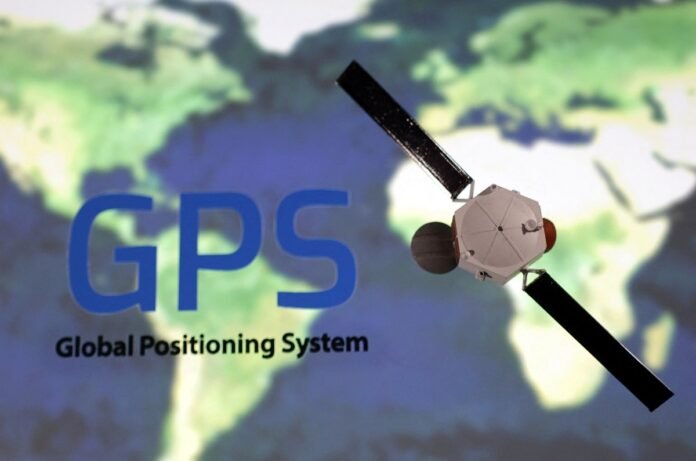This illustration, taken on September 25, 2022, shows the Global Positioning System (GPS) logo and the satellite model on the map.
14:02 JST, July 4, 2024
The Acquisition, Technology and Logistics Agency (ATLA) and a Tokyo-based startup have begun research into a new technology that can detect whether location data transmitted by the Global Positioning System and other systems has been falsified, the Yomiuri Shimbun has learned.
This information has a wide range of applications, including vehicle navigation and identity verification systems, so its falsification could cause widespread disruptions to society. This information is also widely used for national security purposes, such as missile guidance. To protect the accuracy of such information, the agency and LocationMind Inc. are seeking to use their new technology both commercially and militarily.
LocationMind, which was founded by researchers at the University of Tokyo and analyzes positioning information, is conducting research into this new dual-use technology. The ATLA will provide financial assistance of ¥576 million over four years, starting in fiscal 2023, through a framework for promoting security technology research that supports basic research into consumer technologies that have potential future applications in defense technologies.
GPS and other satellite positioning systems send a signal to a receiver on the ground and then measure the distance between the satellite and the receiver based on the difference between the times the signal was sent and received. By using signals sent by at least four satellites, a location on the ground can be calculated with a high degree of precision.
However, an attacker can manipulate location data by creating and transmitting fake signals from the ground and having the target of the attack receive these fake signals. In some cases, attackers can falsify their own position data to hide their true location.
ATLA and LocationMind will investigate methods to combat this threat using their new technology. Even satellites built to the same specifications will have slight differences in their radio wave characteristics based on the conditions and time period in which they were built. These differences are identifiable as a human fingerprint, so a database of this “radio frequency fingerprint” will be created. By comparing transmitted signals to real signals recorded in the database, the technology can identify fake signals and display correct positioning information.
According to an American research institute, Russia is suspected of being the source of the false GPS signals detected in Ukraine. There have also been confirmed cases of falsifying position data for illegally operating Chinese fishing vessels.
Japan is continuing efforts to use electronic signatures to counter attempts to manipulate such signals. However, it is difficult to detect when genuine location information signals received on the ground have been copied and retransmitted from another position, so that the receiver receives false information.
This method hasn’t been seen much so far, but it could become commonplace in the future. LocationMind says its new technology can detect such spoofed signals, and this year the company will capture a huge amount of positioning signal waveform data and launch a large-scale study of radio frequency fingerprinting.
Observers are concerned that interference with the positioning information used by guided missiles and drones could have a negative impact on the nation’s security. ATLA, eager to bolster research into dual-use technologies, plans to launch a new “ATLA innovation and technology laboratory” this fall and will continue to support LocationMind.
“We will take swift steps to contribute to the country’s defense and the long-term resilience of its social infrastructure,” said Tomoaki Fujita, director at LocationMind.



